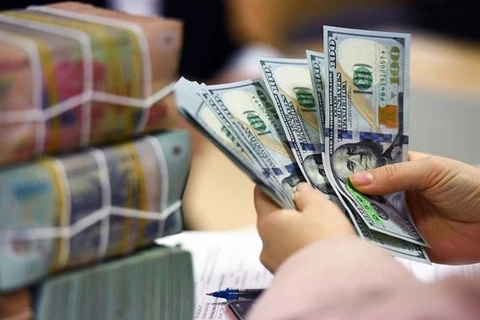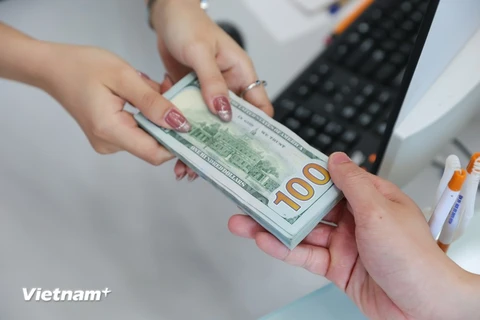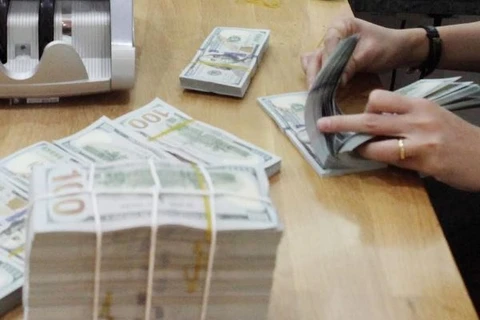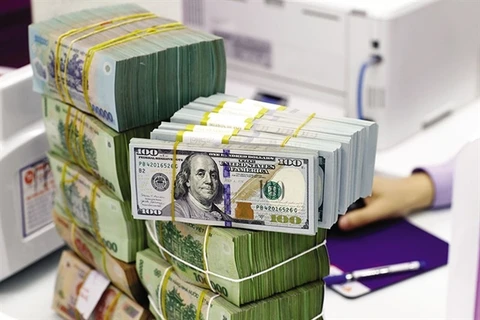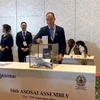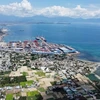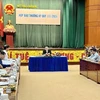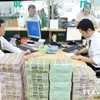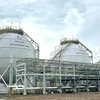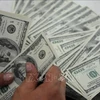
Hanoi (VNA) - In the early months of 2024, the USD/VND exchange rate in the domestic market rose sharply. In mid-April 2024, the USD price at banks capped out, despite the State Bank of Vietnam consistently raising the central exchange rate (thus increasing the exchange rate ceiling).
Deputy Governor of the State Bank of Vietnam Dao Minh Tu attributed the exchange rate increase to the fact that the US Federal Reserve (Fed) has yet to specify a timeline for easing monetary policy or lowering interest rates. Consequently, the value of the USD surged significantly. The appreciation of the USD impacts the depreciation of other currencies worldwide and in the region. This, in turn, affects the Vietnamese currency in its exchange rate relationship with the USD.
Secondly, Vietnam's interest rate reduction policy has been very aggressive in recent times. This has created an interest rate differential between the VND and the USD in the interbank market, with the Vietnamese interest rate continuing to remain lower than the USD interest rate. This disparity is one of the pressures causing the USD to appreciate.
Third, in the first four months of the year, imports have been relatively strong, leading to a higher demand for foreign currency compared to previous periods.
The rising exchange rate has caused concerns among import businesses, as high exchange rate fluctuations could lead to losses. To maintain profitability, businesses plan to increase their selling price, but they worry about a potential drop in orders.
Economic expert Dr. Nguyen Tri Hieu said geopolitical conflicts in certain regions have made gold a "safe haven" for investment capital, causing global gold prices to continuously reach new peaks.
In Vietnam, gold prices are influenced by various factors such as exchange rates, inflation, macroeconomic conditions, and the supply-demand balance. Despite strong fluctuations, gold prices are trending skyward.

The rising exchange rate has greatly affected import businesses. To mitigate the damage, some enterprises are intensifying efforts to seek domestic sources of raw materials to replace imports and increase exports to markets that pay in USD.
Empirical research in Vietnam has shown a relatively large impact of the USD/VND exchange rate on inflation. Conservative estimates indicate that for every 1% depreciation of the VND, inflation will increase by 0.34%. Therefore, according to this study, with a depreciation of 4.5% since the beginning of 2024, inflation will increase by an additional 1.5%. This is not taking into account natural price increases such as domestic fuel prices rising with global oil prices.

WiGroup recently released a macroeconomic report stating that the State Bank of Vietnam has sold approximately 500-700 million USD to cool down the exchange rate.
Experts from WiGroup also believe that the exchange rate is expected to stabilize in the second quarter of 2024. The reason for reducing exchange rate pressure is that the Fed has not determined the timing of the first interest rate cut in 2024 but has slowed down the pace of quantitative tightening (seen as a mild easing move).
To control the exchange rate, Nguyen Duc Hung Linh, an economic and financial expert from Think Future Consultancy, believes that regulatory agencies need to implement liquidity absorption, through bonds and other transactions to raise interbank interest rates. They should also sell foreign exchange reserves in varying amounts in line with market exploration and stability (currently being implemented). A final move is to raise operational interest rates in case the first two steps are not enough to cool down the heat in exchange rates./.
